Reviews for December 12th, 2008
Adam Resurrected
Directed by Paul Schrader.
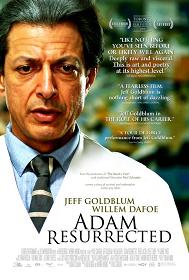
Based on the novel by Yoram Kaniuk. In 1961, Adam Stein (Jeff Goldblum) becomes a resident of an asylum for Holocaust survivors. He flirts with a sexy nurse, Gina Grey (Ayelet Zurer), unbeknowst to others at the facility, while distracting Dr. Nathan Gross (Derek Jacobi) with his crazy, long-winded speeches. Thirty years earlier, Adam was a cabaret singer, magician, minder reader, and clown who entertained many different audiences. One of those audience members happened to have been Commandant Klein (Willem Dafoe), a Nazi officer who had witnessed his show and enjoyed it immensely. Adam recalls these past events throughout his stay at the facility and the more he recalls them, the easier it is to grasp what truly haunts him into behaving so insanely. He can barely recognize his own self and reacts frightening by a young boy (Tudor Rapiteanu) who acts like a dog at the asylum. Although that scene feels very strange and confusing at first, it becomes more coherent and purposeful once Adam remembers how Commandant Klein had forced him to be his slave during the Holocaust by acting like a dog in exchange for his survival. Screenwriter Noah Stollman infuses the genres of magical realism, drama and dark comedy with mixed results. Jeff Goldblum impressively masters a broad range of emotions from sadness to joy, fear and bewilderment. It’s hard to take any scenes with him seriously, though, because of director Paul Schrader’s awkward editing style that juxtaposes flashbacks too distractingly in a way that induces nausea. A poorly developed subplot involving Adam hitting on a sexy nurse doesn’t quite gel into anything particularly interesting. Comparisons to One Flew Over the Cuckoo’s Nest are inevitable during the scenes in the asylum, but you never really get to know any of the patients besides Adam. Adam Resurrected ultimately manages to be a well-acted, sporadically intriguing drama that has a few poignant moments as Adam recalls the traumatic events from his past, but its convoluted, unfocused plot fails to pack an emotional wallop as a whole. Number of times I checked my watch: 4. Released by Bleiberg Entertainment. Opens at the Quad Cinema.
The Alphabet Killer
Directed by Rob Schmidt.
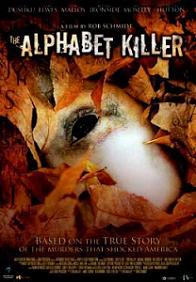
Based on a true story. Megan Paige (Eliza Dushku), a police detective, searches for the killer who murdered and raped a young girl. Throughout the investigation, she has visions of the ghost of the murdered girl and realizes that the first letters of the girl’s first and last name are the same as the first letter of the town where she was murdered. Her boyfriend, Capt. Kenneth Shine (Cary Elwes), also a detective, thinks she’s crazy and, soon enough, she ends up at a hospital after slitting her wrists during some sort of a nervous breakdown. At a mental health group, she befriends a strangely behaving patient, Richard (Timothy Hutton). Once she gets back onto the police force in a more low-key position, another young girl is found murdered and her first and last name happen to begin with the same first letter of the town she was found at. The plot does have its fair share of mysterious, such as the identity of the killer is and why Megan sees so many apparitions throughout her investigations. Unfortunately, screenwriter Tom Malloy fails to generate any real suspense because he often allows the audience to be a step ahead of Megan, who comes across as an unprofessional, dim-witted investigator. The murder mystery itself doesn’t have that many interesting or intriguing aspects to it other than how the killer chooses his victims. Much of what happens as Megan gets further and further into the case feels contrived, such as when she goes up to a potential suspect’s home to try to calm him down after he, allegedly, attempting to rape his stepdaughter. There’s nowhere near as much tension and intrigue as in the far superior crime thriller Zodiac. Director Rob Schmidt, who previously directed the horror film Wrong Turn, tries his best to add chills through an eerie musical score and the flashy special effects of the ghosts that pop up every now and then. Essentially, The Alphabet Killer suffers from the same symptoms as Passengers: both have an unintentionally feeble-minded character who lazily investigates a mystery while the plot itself seems dull and poorly developed. By the time the last scene arrives to try to shock you, the plot, in hindsight, has almost as many holes as you’d find Swiss cheese. Number of times I checked my watch: 4. Released by Anchor Bay Entertainment. Opens at the Cinema Village.
Dark Streets
Directed by Rachel Samuels.
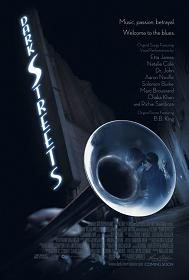
Chaz Davenport (Gabriel Mann), the new owner of a nightclub called The Tower, becomes suspicious of the recent death of his father, who had been the CEO of Consolidated Power Company. The CEO is now Chaz’s smarmy uncle, Nathaniel (Michael Fairman). Chaz does his best to avoid the dangers of some gangsters who he owes money to, he romances the seductive Madelaine (Izabella Miko), which doesn’t make his past girlfriend, Crystal (Bijou Phillips), a singer at the club, too happy. An aggressive police lieutenant (Elias Koteas) pressures him to audition Madelaine to become a new singer at the club. Meanwhile, there are many mysterious blackouts going on throughout the entire city. Soon enough, Chaz finds a letter that his father wrote to a woman which was supposed to be delivered after his death. As he investigates who might have murdered his father after he and why, he gets deeper and deeper into trouble. Despite its stylish cinematography, exquisite set and costume designs along with its soulful blues and jazz soundtrack, the film doesn’t have that much more to offer to keep you truly engaged throughout. Chaz’s investigations into the murder of his father aren’t particularly intriguing or suspenseful because, for one thing, his skills at investigating are quite poor and don’t really lead anywhere interesting. Secondly, the Wallace King’s screenplay, based on the play by Glenn M. Stewart, fails to bring any of the characters to life so that you care about them or what happens to them. The audience doesn’t get a chance to meet Chaz’s father and there’s not enough information about the relationship between him and Chaz to begin with. Also, Chaz has virtually no romantic chemistry between neither Madelaine nor Crystal, so you won’t really care about Crystal’s feelings when he falls for Madelaine’s seductions. Director Rachel Samuels essentially puts style over substance in a way that would probably have been enjoyed more from the perspective of a live audience watching the stage production. Dark Streets does looks great and sound great, but it doesn’t have enough heart and soul and, ultimately, seems too artsy-fartsy while leaving feeling cold. Number of times I checked my watch: 4. Released by Samuel Goldwyn Films.
The Day the Earth Stood Still
Directed by Scott Derrickson.

Dr. Helen Benson (Jennifer Connelly), a scientist, arrives at a secret government facility where she encounters Klaatu (Keanu Reeves), an alien in the body of a human that had just arrived via a large, spherical UFO that landed in Central Park. The U.S. government, including the Secretary of Defense (Kathy Bates), immediately seizes Klaatu to find out whether or not he poses a threat to mankind after he claims that the Earth doesn’t belong to mankind. However, Dr. Helen Benson reaches out to Klaatu by whispering to him a warning to run away from the facility, which he does do. Both of them form an unlikely bond that allows her to ask him his true motives, which won’t be spoiled here, but it has something to do with how mankind has reached a tipping point in a downward spiral by destroying the Earth, i.e. the environment. Will Dr. Helen Benson be able to convince Klaatu that the human race is worth saving? That’s the truly intriguing question that the film poses and it feels quite riveting to watch as the Klaatu struggles to answer it. Soon enough, Dr. Helen Benson and her stepson (Jaden Smith) go on a journey to reach out to Klaatu while trying to avoid being captured by the government. The screenplay by David Scarpa, reworked from the 1951 version of the film, infuses sci-fi elements along with suspense, intrigue, drama and a few intense action sequences. There’s a crucial, thought-provoking, well-written scene involving a mathematician (John Cleese) who, besides helping Klaatu to discover the beautiful music of Bach, explains to him in a coherent way how there can be hope for the human race. A few contrived, silly moments seem a bit distracting, though, such as when the Secretary of State needlessly explains that there will be a flood after comparing the ongoing catastrophe to Noah’s Ark. Director Scott Derrickson moves the film along at brisk enough pace so that no scenes drag. He also wisely doesn’t include too much action so that the film remains driven by the interesting character of Klaatu, his motives and his perspective on the human race. When the action and special effects kick in, they look quite dazzling and mind-blowing. Although screenwriter David Scarpa doesn’t profoundly explore the issue of mankind's destruction of the environment, at least that important, timely message remains simple and accessible enough for this generation to comprehend. It’s also worth mentioning that Keanu Reeves’ intentionally cold performance recalls his very similar performance in another sci-fi movie, The Matrix. At a running time of 110 minutes, The Day the Earth Stood Still manages to be a highly entertaining and gripping sci-fi thriller with brains. Number of times I checked my watch: 1. Released by 20th Century Fox.
Delgo
Directed by Marc F. Adler and Jason Maurer.
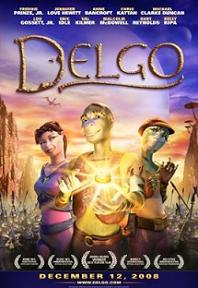
Sedessa (voice of Anne Bancroft), the smarmy empress of the Nohrin race gets banished for her evil plans and pits her race against the Lockni race. When Delgo (voice of Freddie Prinze Jr.) meets Kyla (voice of Jennifer Love Hewitt), the Nohrin princess and begins a forbidden romance with her, that creates even more tension between the two races. Soon enough, Sedessa kidnaps Kyla and it’s up to Delgo as well as a General Bogardus (voice of Val Kilmer), a member of the Nohrin race, to rescue her. Throughout their adventure, Delgo proves his trustworthiness to Bogardus and the two become unlikely friends. The screenplay by co-directors /co-writers Marc F. Adler and Jason Maurer takes a while to build up momentum and might initially seem a bit confusing for little kids to follow. Once Delgo goes on the rescue mission to save Kyla, though, that’s when the adventure picks up and the fun begins. The dialogue often sounds stilted and some scenes fall flat with blandness, especially when Delgo interacts with Bogardus throughout the journey. Delgo himself isn’t really enough of an imaginative character to stand out among other animated heroes such as Shrek. Also, there’s not enough comic relief to please adults, although kids will be amused. On a positive note, the pace moves along quickly enough so that there aren’t any scenes that actually drag. The CGI animation itself isn’t particularly mind-blowing like in Wall-E or Bolt, but at least it looks decent and has plenty of bright colors to keep your eyes somewhat glued to the screen. Despite a somewhat unimaginative plot with dull characters that aren’t as endearing or memorable as they could have been, Delgo at least manages to be a mostly engaging, fun and exhilarating adventure for all ages, as long as you’re willing to check your brain at the door and suspend your disbelief during the ideal running time of 90 minutes. Look at the bright side: at least it’s less cringe-worthy and a whole lot more entertaining than Happily N’Ever After. Number of times I checked my watch: 3. Released by Freestyle Releasing.
Doubt
Directed by John Patrick Shanley.

Based on the play by John Patrick Shanley. In 1964, Sister Aloysius Beauvier (Meryl Streep), a principal at a Bronx Catholic School, initially suspects that Father Brendan Flynn (Philip Seymour Hoffman) might be hiding a dark secret. Sister James (Amy Adams) notices that her a new Black student, Donald Miller (Joseph Foster II), had returned from the priest’s rectory looking frightened and dejected with his head pointing downward as he sits in his chair. When she reports that observation to Sister Aloysius, they both keep Father Brendan under close watch for suspected sexual abuse of Donald, although neither of them explicitly mention “sexual abuse” or similar words. Much of what happens throughout the film occurs through implication and subtleties that hint at something potentially darker. Occasionally, writer/director John Patrick Shanley hits the audience over the head with symbolism, such as a storm brewing outside of a window, a light bulb burning out and flickering back on and, the most obvious one, a cat that had caught a mouse. The dramatic tension comes from the overarching question that the film asks: Is Father Brendan truly the monster that Sister Aloysius thinks he is? Shanley doesn’t actually show to the audience what occurred between Father Brendan and Donald—not even in flashbacks. He leaves it up to your own imagination to interpolate the details of that event by observing closely to the confrontations between Sister Aloysius and Father Brendan as well as him and Sister James, to whom he tries to logically explain his suspicions actions to, none of which will be spoiled here. Is Sister James merely naïve and gullible or is she being rational? Decide for yourself as you closely observe those and other confrontations. There’s a very powerful scene when Sister Aloysius confronts Donald’s mother, played by Viola Davis in a truly bravura performance that will move you to tears. That scene alone reveals a lot about what kind of home Donald comes from and,doesn’t come to any solid conclusions that proves that Father B rendan sexually abused Donald. Meryl Streep delivers a strong performance, mastering the sternness of Sister Aloysius with skill just as expected. Her tone of voice during her confrontations with Father Brendan show her concern about Donald’s safety, but, at the same time, shows that she’s not too great at being an investigator with an intimidating and accusatory demeanor from the get-go. Her flaws make the overarching question about Father Brendan a more multifaceted mystery. Regardless of whom you believe throughout the mystery, Doubt manages to be a mostly intriguing, intelligent and moving drama with well-nuanced performances. Number of times I checked my watch: 1. Released by Miramax Films.
Dragon Hunters
Directed by Guillaume Ivernel and Arthur Qwak.
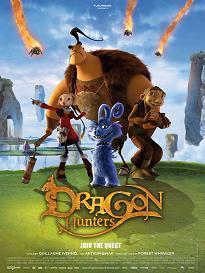
Zoe (voice of Mary Matilyn Mouser) wants to help her uncle, Lord Arnold, defeat the World Gobbler, a fiery-eyed dragon that awakens every twenty seasons to wreak havoc upon Lord Arnold’s fortress. When he had once fought the dragon and stared into its eyes, Lord Arnold lost his normal vision and all he could see since then is a dark, dreary landscape with “no life and no joy.” Soon enough, Zoe runs into Lian-Chu (voice of Forest Whitaker) and his sidekicks, Gwizdo (voice of Rob Paulsen) and Hector, a blue dog with big ears like a rabbit. Lian-Chu, with his strong muscles and tallness, has the physique of a dragon slayer, but doesn’t initially act like one—you’ll find him knitting at first. He and Gwizdo both agree to fight the World Gobbler in exchange for lots of gold from Lord Arnold if they succeed in defeating it. Both Lian-Chu and Gwizdo even have an idea about what to do with the gold if they earn it: they want to buy a farm and tend it together. With such attention to detail, co-writers Frédéric Lenoir and Arthur Qwak take a simple good vs. evil story that's smarter and more imaginative than standard Saturday morning fare. For example, when Gwizdo asks the significance of a tree next to the World Gobbler painted on a map on a wall, one of Lord Arnold’s minions replies, “That is for scale,” a statement that’s repeated with plenty of wit later on. Each character has interesting idiosyncrasies that allow them to stand out. For example, Hector, the blue rabbit-looking dog looks unique and bizarre with its posture, eyes and occasional mumblings and sudden reactions. He provides comic relief like the donkey provides in the Shrek series. The action sequences feel thrilling thanks to the spectacular CGI effects and editing that enhance the realism of both the foreground and background. Even the cumulus clouds in the sky look real and move just like normal clouds do. Co-directors Guillaume Ivernel and Arthur Qwak also vividly animate each character’s eyes in a way that gives them a bit more soul and life. Moreover, it’s worth mentioning the terrific voice work of the cast members who add distinguishable personalities to their characters, i.e. Lord Arnold’s booming voice compared to Lian-Chu’s more calm voice. At a running time of only 80 minutes, Dragon Hunters manages to be an exhilarating, imaginative and very fun adventure from start to finish. Number of times I checked my watch: 0. Released by Futurikon Films. Opens at Laemmle’s The Grande Theatre in Los Angeles.
Gran Torino
Directed by Clint Eastwood.
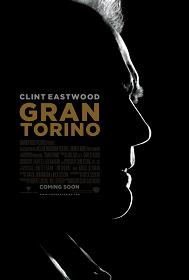
Walt Kowalski (Clint Eastwood), a racist Korean War veteran who recently lost his wife, lives alone with his dog in his suburban Detroit home. A local gang of Hmong teenagers pressure Thao (Bee Vang), a teenager living next door to him, to steal his precious 1972 Gran Torino from his garage in order to prove that he’s a worthy member of their gang. When Walt catches him in the act and confronts him in front of his traditional parents, Thao’s mother insists that he repay him in some way. Soon enough, Walt has Thao working all sorts of small jobs around the house. Walt’s blunt racism and grumpiness initially seems off-putting. He pretty much liberally uses every kind of racist word that comes to mind. However, thanks to Clint Eastwood’s convincingly emotional performance as well as to first-time screenwriter Nick Schenk’s intricate, character-driven screenplay, the hidden layers of Walt’s personality become apparent. There’s clearly a lot of anger, pain and sorrow bottled up inside him and it takes a while to show that, fundamentally, he’s just a kind-hearted man with a very wounded soul. Not surprisingly, Walt becomes a kind of father figure to Thao and, concurrently, tries to shield him as much as he can from the dangerous local gang. During his aggressive confrontations with the gang members, Walt seems much like Dirty Harry and you’ll end up rooting for him. Screenwriter Nick Schenk doesn’t delve too deeply into the relationship between Walt and Thao, so there aren’t really any moments of profound insight or revelations. Yet, there still are some poignant scenes, especially later in the second act as Walt struggles to overcome his pain and to show tenderness toward his Asian neighbors who he had initially treated like dirt. Schenk also wisely adds some comic relief, such as when Thao tries to act tough, mean and manly like Walt does. Admittedly, a subplot involving Thao’s insecurities about asking out a local girl seems a bit contrived, underdeveloped and corny. When he finally gathers up the nerve to ask her out and needs a car to driver her in during the date, how do you think Walt’s ’72 Gran Torino comes to play? Director Clint Eastwood wisely moves the film at a leisurely pace which gives more room for the characters to breathe and for you to feel absorbed by the dramatic and emotionally stirring scenes showing Walt and Thao’s relationship gradually unfolding. At a running time of 116 minutes, Gran Torino manages to be a well-acted, compelling and engrossing drama. Number of times I checked my watch: 1. Released by Warner Bros. Pictures.
Nothing Like the Holidays
Directed by Alfredo De Villa.

A Puerto Rican family from Humboldt Park, Chicago gather together for Christmas. Edy Rodriguez (Alfred Molina), the patriarch, must deal with his wife’s (Elizabeth Peña) threat of divorce. Their son, Jesse (Freddy Rodriguez), recently came back from serving in the Iraqi war and suffers from his physical wounds as well as what seems to be post-traumatic stress disorder. He tries to rekindle his romance with Marissa (Melonie Diaz), the girlfriend he left behind during the war. Then there’s his other son, Mauricio (John Leguizamo), and his wife (Debra Messing) who argue whether or not they want to have a baby so that Mauricio’s mother will finally have a grandchild like she always wanted. Finally, there’s his daughter, Roxanna (Vanessa Ferlito), who’s desperate to become a famous actress in Hollywood and remains fixated on her potential stardom. Despite a terrific ensemble cast who try their best to enliven the film with their charm, much of what occurs feels contrived, overstuffed and mostly dull, especially the whenever they argue with one another at the dinner table. The screenplay by co-writers Alison Swan and Rick Najera offers no real surprises or scenes of genuine poignancy, even when Edy discovers that he has cancer. It’s the oldest cliché in the book of family dramas to have a character that ends up with an illness as a tacked-on way to try to jerk your tears. Cancer was used for the same purpose in The Family Stone, an irritating family drama that also took place around Christmastime. Directed by Alfredo De Villa wisely moves the film along at a appropriately brisk pace and includes mostly appealing characters, especially Edy and his wife, who don’t get on your nerves. It’s also worth mentioning that the plot itself doesn’t aim for lowbrow, silly comedy like in Four Christmases. While there aren’t any profound insights, memorable characters or performances that truly stand out, at least Nothing Like the Holidays manages to be a harmless, slightly charming and warm family drama. Number of times I checked my watch: 3. Released by Overture Films.
Timecrimes
Directed by Nacho Vigalondo.
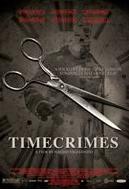
In Spanish with subtitles. Héctor (Karra Elejalde) sits on a lawn chair in his backyard and notices a young woman (Bárbara Goenaga) stripping naked in the woods. Meanwhile, his wife, Clara (Candela Fernández) goes out to get some takeout food for dinner. As he walks toward the nude woman to get a closer look at what’s going on, a man with a pink bandage wrapped around his head stabs him with scissors. Héctor tries to run away from the mysterious man and ends up seeking refuge in a laboratory run by an attendant (Nacho Vigalando). While the bandaged man continues to track him down to, possibly, kill him, Héctor gets into a machine that turns out to be a time machine that bring him back in time to the same moment when he spotted the naked woman. However, he has actually cloned himself he’s Hector #2 while Hector #1 goes after the naked woman. What happens if Hector #2 bumps into Hector #1? Who is the naked woman? Why is the bandaged man chasing after Hector #1? Writer/director Nacho Vigalondo answers these questions one at a time as Hector #2 notices more and more about the events going on around him, which won’t be spoiled here. Hector #2 also goes back in time through the time machine to create a Hector #3 at one point. As the plot becomes more intricate, it makes more sense in retrospect so that seemingly random events end up with a purpose. Through the use of cinematography, musical score and the mysterious events themselves, Vigalondo creates an atmosphere of palpable suspense, psychological horror mixed with sci-fi. At some points, especially once Hector #3 shows up, the outcomes seem easy to predict and the events feel a bit tedious. Nonetheless, by the time the film ends, you’ll feel like you’ve just gone through an invigoratingly imaginative and thrilling ride full of clever surprises and twists. It’s not surprising, though, that there’s a Hollywood remake of Timecrimes in the works which might be directed by David Cronenberg. Number of times I checked my watch: 1. Released by Magnet Films.
What Doesn’t Kill You
Directed by Brian Goodman.

In South Boston, best friends Brian (Mark Ruffalo) and Paulie (Ethan Hawke), turn to a life of crime in order to make a living. The first scene, during which Brian and Paulie participate in a heist gone bad, foreshadows how deep get into a criminal lifestyle. Then the film briefly flashes back to their teenage years to show how a tough crime boss, Pat (Brian Goodman), tempted them into becoming criminals to begin with. Many years later, Brian, now an adult, needs to support his wife, Stacy (Amanda Peet), and two kids while Paulie has no one to support but himself. Once again, they enter the world of thugs and work for Pat. Have they matured enough to find a rational way to straighten out their lifeup? Writer/director Brian Goodman spoils the answer to that question by showing the future heist scene at the very beginning. The dramatic tension lies instead on how Brian and Paulie will end up in that dangerous situation. After a detective (Donnie Wahlberg) catches them and throws them in prison for five years, Brian’s moral conscience gradually takes over and he begins to have second thoughts about working for Pat. Paulie pressures him to become a thug while his wife pressures him to lead a more tranquil lifestyle. That tug of war represents what’s going on in Brian’s mind as well, which adds some dramatic tension. Mark Ruffalo delivers an Oscar worthy performance that's both sensitive and surprisingly moving. It's very absorbing to watch as his character goes through internal transformations throughout the film. Brian is certainly a very flawed individual, as is Paulie, but at least he has a good heart somewhere inside him. The dramatic momentum slightly wanes when the film often skips ahead a few years in Brian’s life later on, which makes you wonder what went on during all that time. At least the organic screenplay allows you to care about him so that by the time the third act comes around, you want him to survive by making the right moral decisions. At a running time of 100 minutes, What Doesn’t Kill You manages to be a mostly gripping, well-acted and surprisingly engrossing crime drama. Number of times I checked my watch: 2. Released by Yari Film Group.
Where God Left His Shoes
Directed by Salvatore Stabile.

Frank Diaz (John Leguizamo) and his wife, Angela (Leonor Varela), and two young kids, Christina (Samantha Rose) and Justin (David Castro), end up in a homeless shelter after being evicted from their apartment. When he’s offered a low-income apartment for his family to stay in time for Christmas, he’s unable to have it because he doesn’t have a job that will ensure him a steady source of income. His past employment was as a boxer, but that was off-the-books so he can’t prove it. He has until 6 PM that that evening, which happens to be Christmas Eve, to secure a job on-the-books or else the apartment will go to someone else. Frank wanders around New York City with his 10-year old stepson, Justin, trying to find a job while his wife and daughter stay behind at the shelter. Of course, he runs into a few obstacles along the way, including a criminal record that comes to haunt him a few hours after working as a painter at school. The screenplay by writer/director Salvatore Stabile has a few genuinely poignant moments, such as when Frank bonds with Justin and looks after him after he falls down and gets a cut on his hand. Other scenes feel hackneyed as Frank and Justin run away from a police officer for jumping turnstiles and, later, running away from security guards for theft. The same can be said about a scene involving Justin’s real father who shows up when needed. John Leguizamo gives a decently moving performance that allows you to care about what happens to Frank and his son. Unfortunately, the film loses its momentum as it feels more and more tedious and the events that Frank and Justin go through become less interesting and surprising. There aren’t enough scenes showing Angela interacting with Christina and the family interacting with one another before the eviction. Also, the third act unfolds in a rather lazy way with an abrupt, overly facile ending that leaves a lot of unanswered questions. With a more organic and imaginative screenplay, Where God Left His Shoes could have been much more emotionally resonating and powerful. Number of times I checked my watch: 2. Released by IFC Films. Opens at the IFC Center.
While She Was Out
Directed by Susan Montford.

Della Myers (Kim Basinger), a suburban housewife, lives in a quiet neighborhood with her abusive husband, Kenneth (Craig Sheffer), and two young children. On Christmas Eve, she gets into a fight with him because he feels that she doesn’t do anything all day and doesn’t clean up the house enough. To get away from the domestic dispute, she leaves the house to shop for gift wrapping paper at the mall. Danger seems imminent as she drives down dimly-lit streets. Is someone following her on her way there? Will her car break down? When she reaches the mall’s overfilled parking lot and drives around looking for a space, she gets so frustrated that she places a mean-spirited note on the windshield wiper of car that takes up two spaces. Just when you think that Della’s husband will come to abuse her further in some way, that small little incident involving the note sets the course of events that lead to Della trying to run away from a group of young delinquent thugs who happen to be the owner of the car. Kim Basinger has played a character in peril before in Cellular and, in this case, she’s pretty much treading the same water. She knows how to convincingly act frightened, but writer/director doesn’t give her enough material to chew on here to show off her range of acting skills beyond that. It feels quite tedious to watch the catch-and-mouse game between Della and the thugs, none of whom rise above their stereotype and one-dimensionality. Neither of them, even the gang leader played by Lukas Haas, seems particularly intimidating or scary. Writer/director Susan Montford should have added more genuine tension and intelligent twists rather than just show Della trying to outsmart the gang in a by-the-numbers, contrived and obvious way. She does include some grisly deaths and takes advantage of the dark forest setting to slightly enhance the creepy atmosphere, but that’s not nearly enough to keep intelligent audience members truly riveted or thrilled. The very last scene, which won’t be spoiled here, feels rather abrupt, over-the-top and tacked-on. While She Was Out starts out quite compelling, but quickly it quickly loses steam because it lacks imagination and fails to maintain any credible suspense or thrills throughout. Number of times I checked my watch: 4. Released by Anchor Bay Entertainment.
Main Page
Alphabetical Menu
Chronological Menu
______________________________________________________
|













